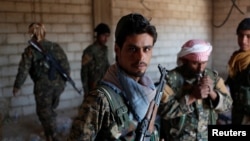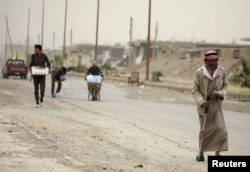Kurdish-led fighters made further advances Tuesday in the fight to oust the Islamic State terror group from its de facto capital of Raqqa in northern Syria. They have been consolidating their foothold in the old city, while amassing soldiers in the eastern suburbs, ready for a deeper strike, say commanders with the U.S.-backed Syrian Democratic Forces.
The military advances appear not to have dispelled local Arab anxiety, however, about the Kurds’ long-term intentions for Raqqa and its outlying villages.
Although eager for the jihadists to leave, Raqqa’s Arabs remain wary of the Kurdish People’s Protection Units, or YPG, worrying the Kurds have territorial ambitions for the Arab-majority city.
That concern has mounted following the expulsion this week of an Arab militia from the SDF for retreating in the face of Islamic State fire. Claims of abusive treatment of local young Arabs at the hands of the advancing U.S.-backed forces also are adding to sectarian tension.
On June 30, a video surfaced in the Turkish media of two soldiers wearing YPG uniforms kicking two local Arab men and stomping on them while screaming at them to disclose the location of IS fighters. In the video, the detainees from a village west of Raqqa insist they don’t know the whereabouts of IS extremists.
The YPG soldiers who were filmed were, in fact, Arabs but this has not served to tamp down local anger over the ugly incident. YPG leaders have acknowledged to local media the authenticity of the video. They have denounced the abuse “in the strongest terms,” describing it as “absolutely unacceptable.”
In a statement, the YPG added, “Since they have broken laws and international norms, they will be held accountable for their irresponsible, individual acts.”
Local Arab suspicions of the Kurds, according to some accounts, haven’t been diminished by the participation of Sunni Arab militias in the assault on Raqqa — an engagement initially insisted on by Washington, though one that has seen Arab militias from the rebel Free Syrian Army seeking battlefield roles.
Long-term stability at stake
Analysts say that providing stability for Raqqa and avoiding rights abuses following the expulsion of the Sunni militants from the city will be crucial in determining the future chances of IS being able to mount a prolonged insurgency in northern Syria. They have warned for months that if the Kurdish-led SDF fails to oversee the city and its outlying villages evenhandedly and within traditional Arab and tribal power structures, the odds of future sectarian conflict will increase, providing an opening for the jihadists.
“The resulting deficit of trust between the Kurds and Arabs in some areas could be a fault line that jihadis exploit to try to return to liberated areas,” cautions Hassan Hassan, an analyst at the Tahrir Institute for Middle East Policy, a Washington-based think tank, and co-author of the book ISIS: Inside the Army of Terror.
Trust has been in short supply between Arabs and Kurds in northern Syria since even before the start of the uprising six years ago against Syrian President Bashar al-Assad. In the 1970s, Hafez al-Assad, Bashar’s father, displaced tens of thousands of Kurds in the province of Raqqa in order to resettle Arab families. Raqqa’s Arabs fear the Kurds now may seize the opportunity to even the score and engineer a Kurdish expansion, which would result in an upending of current demographics.
IS propaganda, as well as YPG expulsions of Arabs from some villages last year captured by Kurds in northern and eastern Syria, haven’t helped to dispel Arab anxiety — nor do incidents of SDF abuse of detainees.
Raqqa locals allege the anti-Islamic State forces are all too ready to suspect people who continued to live in Raqqa under IS rule of being jihadists or fellow travelers. Relatives of local IS fighters also are quickly viewed as having been complicit with the jihadists, they say.
Activists with a network called Raqqa Is Being Slaughtered Silently reported Monday that SDF units have been mounting arrest raids and detaining young men from villages in the Raqqa countryside.
Some detainees have been taken to training camps and obliged to join so-called Self Defense Forces.
"They are told they will be working to achieve a Democratic Nation in Syria," the activist network says. "The attacking militias have been demanding that young men in the newly controlled villages join the SDF before their families can be allowed to return to their homes."
Kurdish officials dispute the allegations and say many detainees are freed quickly, once it is ascertained they are not IS members. They maintain that even those who were IS members but did not kill or commit heinous crimes will be pardoned.





